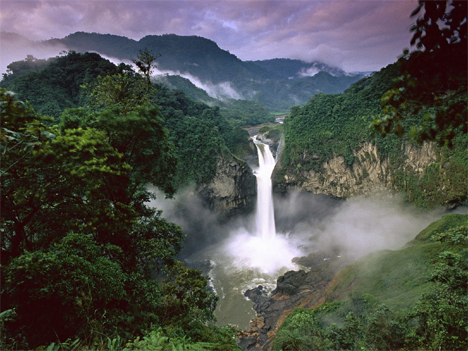Liberal director Oliver Stone revealed his anti-American bent on Monday’s Good Morning America, praising the rise of mainly left-wing leaders across South America and even went so far to support Brazilian President Lula da Silva for “trying to strike to deal with Iran,” wildly predicting ” it’s going to be like North Vietnam again ” if the U.S. pursued sanctions against the country. Anchor George Stephanopoulos interviewed the Oscar-winning director 44 minutes into the 8 am Eastern hour. Stephanopoulos referenced how Stone has “tackled war, Wall Street, and the Kennedy assassination” and is now “taking on South America. He says our neighbors to the south haven’t gotten a fair shake from the American media, and, armed with a camera, he’s set out on a road trip to try to change that.” Before asking about Chavez, Stephanopoulos played a clip from Stone’s documentary “South of the Border,” which included a sound bite from CNN’s John Roberts that gave the impression that the anchor was condemning the Venezuelan leader: “He’s more dangerous than Bin Laden, and the effects of Chavez, his war against America, could eclipse those of 9/11.” Actually, Roberts, in the January 15, 2009 segment from his American Morning program, actually was reading a quote from a book by his guest, Doug Schoen: “Right off the bat, in the very front of the book, you quote Otto Reich, who was the former ambassador to Venezuela back in the 1980s, as saying that he’s more dangerous than bin Laden and the effects of Chavez, his war against America could eclipse those of 9/11.” Earlier, the ABC anchor asked, “Why take this on?” The director characterized the left-wing trend in leaders in South America as a “march towards reform” and praised these favorite leaders on the continent without naming them: STONE: They have democratically-elected leaders who look like the people who elected them. They have a priest in Paraguay. They have a woman in Argentina. They have an Indian leader- the first Indian- in Bolivia. They have an economist in Ecuador and they have a soldier who’s poor- comes from a poor family- who was elected three times in Venezuela- that’s Hugo Chavez. These are good people. When you look in their eyes, you see it, and you see it on film. That’s why you have to do a film because on paper, it sometimes it didn’t come across, you know? The leader of Paraguay, Fernando Lugo, is actually a former Catholic bishop who admitted that he fathered a child with a woman in her 20s when he was still a bishop. Lugo led a mainly left-wing coalition into office when he was elected in 2008. Argentina’s president, Cristina Fernandez de Kirchner, nationalized $30 billion in private pension funds late in 2008. Bolivian President Evo Morales and Ecuador’s executive, Rafael Correa , are both avowed socialists. The ABC anchor later pressed the director on his endorsement of his Venezuelan “soldier:” STEPHANOPOULOS (live): Do you believe Hugo Chavez is a good person? STONE: Yes, I do- absolutely . STEPHANOPOULOS: But even the United Nations has said that Hugo Chavez has not been a paragon of free speech- his crackdown on the media in his own country. STONE: I have not seen that report. I know that- you know, there’s no pattern of censorship in this country . I’ve been there. So, you can see it. You can go down to South America, spend three days, and you’ll see the most vibrant opposition in the world . STEPHANOPOULOS: One of the reasons the United States has put a lot of pressure on Chavez is over oil, you believe, and there was particular opposition from the Bush administration. How do you think the relationship may change, now that President Obama is in office? STONE: Well, I hope it changes because America seems to want to control every oil-producing nation in the world, whether it’s Iraq or Iran or Venezuela. Since Stone named Iran, Stephanopoulos mentioned how “the president of Brazil [is] trying to strike a deal with Iran, counter to what the Obama administration is looking for.” The director replied that this move as a ” good thing .” When the anchor asked why, Stone made his “North Vietnam” comparison: STONE: Because- well, the march to sanctions in Iran. We want sanctions. We want- it seems to me, once they start intercepting their ships, we’re going to be in a- it’s going to be like North Vietnam again. We’re going to get into a position where we’re going to get closer to war. There’s no reason for to us go to war in Iran, any more than there was a reason to go in Iraq – STEPHANOPOULOS: Even if they want to build a nuclear weapon? STONE: Hmm? STEPHANOPOULOS: Even if they want to build a nuclear weapon? STONE: I think that has to be discussed. So the Oscar winner not only acted as a left-wing apologist but also vouched for inaction against a nation who has nuclear ambitions and has made threats against its neighbors. Stephanopoulos and Stone concluded by briefly discussing how the director was also releasing a sequel to his acclaimed 1987 movie, “Wall Street.” After thanking his guest, the ABC anchor noted that “‘South of the Border’ is open in New York now” as a title graphic for the movie flashed on screen. But, in a parallel to Stone’s edit of Roberts, the graphic that ABC used for the movie was actually cropped from its movie poster which emulated left-wing propaganda art . Eagle’s talons represented United States’s power in South America on the poster, which were mounted on top of South America which was appropriately painted red.

See more here:
Oliver Stone Lauds Hugo Chavez, Criticizes Action Against Iran on ABC’s GMA



























